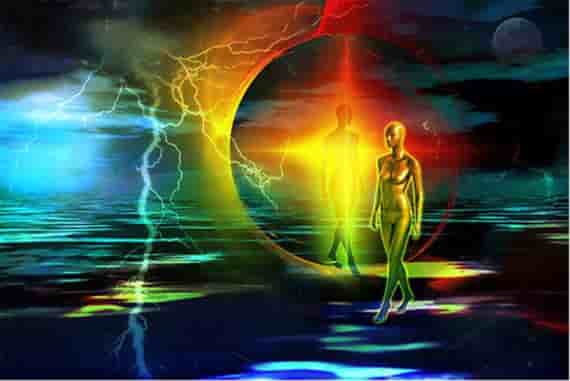Before we embark on the eye-opening journey through the words of Bundy’s collective, I’d like to ask you a small favor. As a surprise for Jamie, I’d like those of you who can to write a little something about what she means to you. After all, she has given our Erik a voice, and for that I am so grateful. You can send what you can to my email: emedhus@gmail.com. I’ll also remind you at the end of the entry, although I doubt you all are as forgetful as me!
Me: Did that duality help you understand the opposite side of suffering so that you could have a fuller understanding of joy?
Victim: Yes. Most of the women that he pursued were stronger, confident women. He enjoyed tearing that part of them down. He enjoyed the rape of the emotional side before the physical rape.
Me: Okay. Now are you in the same soul family as Bundy?
Victim: No, but there are women who were.
Me: Okay. So, have you met him in the afterlife, and if so, how was he? Was he contrite? Was he apologetic?
Victim: We did meet him. He had the opportunity to make amends with all of us. In the afterlife—
(Pause)
Jamie: She’s talking, but, I don’t know, it just kind of faded out. I don’t get it. Erik’s telling her to talk directly to me instead of to the room.
Victim: In the afterlife, you have all the opportunities to mend and heal your energetic tears. They do not need to be done with the specific soul or person who caused the discomfort and the pain on Earth, but it is good to have a completion or full circle on it. It doesn’t need to be that way though. For me, I did meet him. It took a long time after his death before he came about.
Jamie: I guess she means before he woke up. Oh, he died in Florida.
Me: Okay.
Jamie (giggling): Peninsula. Kind of like Texas.
Victim: He took a long time to forgive himself and work on what his mental and psychological needs were and to heal himself emotionally. Then when that happened, he was able to meet the people that he harmed in his life. And that’s not just necessarily the victims themselves but also their families.
Me: Oh, yeah! Of course. Did he ask for forgiveness?
Victim: In an earthbound story that is what you would need to hear, but here, there is no need to have the conversation of “I’m sorry” and “I forgive you.” You can feel it in the person’s energy. There’s no room for hidden agendas or lies. Everything is very transparent, and you know when someone is asking for forgiveness or saying I’m sorry when they’re able to—
Jamie: That’s a nice visual. The words sound a little rough, but it’s not as rough as she’s saying.
Victim: The spirit pushes themselves outward to stand in the person’s energy, and you understand immediately how they’ve forgiven themselves and what their regrets are and how they love you. It’s not necessarily a sit down, deep conversation. It happens within a moment of time.
Me: I see.
Victim: It’s understood, and it’s better than conversation, because you have no doubt that there is nothing hidden.
Me: Exactly. That makes perfect sense.
Victim: He no longer has deep sorrow and a need and a desire to tear apart lives to figure out what its worth is and how to love it. He has no desire to come to Earth and try again—not for now.
Me: Good. Do you forgive him or is that a part of the same question we asked?
Victim: I have. If my life beyond the one of Earth wasn’t as joyous and happy as it is, then I probably would have had a harder time letting go of what happened, but the gifts and opportunities of the life I have now has given me great joy. I don’t have a lifetime of suffering.
Me: Oh, that’s wonderful. Now, how can we learn to forgive people like him? A lot of the blog members, including me, have a hard time understanding how there is no right or wrong—that there just “is.” We just can’t wrap our head around that! What can you tell us that might help us?
Victim: It’s like taking any other historical figure that has caused great pain and death and suffering. I find it overzealous—
Jamie: Can you say it again?
(Pause)
Jamie: She’s talking about the people who were not harmed by Ted. They’re the ones who are having the difficulty forgiving, but they weren’t even the ones to feel the immediate pain. They’ve taken up with the identity of what is fair or equal. That person’s concept of balance is more based on revenge than compassion. It is a very old, engrained pattern, and it must be set aside for the future of the Earth to evolve and survive.
Me: It’s so difficult.
Victim: I agree that especially for those on Earth it is difficult, but for those who are just witnesses, their opinion is just that—an opinion.
Me: Yes, of course.
Victim: But they make it so quickly into fact, and they rally around opinions that turn into misguided energy.
Jamie: I know she’s trying to make a good point, but…
Me: Like the concept of right and wrong? Is that what you’re saying?
Victim: Yes. It’s not about judgment. People on Earth judge all the time about what is right and wrong, and if there’s no judgment in Heaven, why is there judgment on Earth?
Me: Well, how can we learn not to judge and not to have this sense of fairness and unfairness?
Victim: Like you said, it’s harder to accept things for what they are, but this is the lesson that’s being presented.
Me: I suppose everyone has their own individual path toward that goal.
Victim: And it’s why stories like mine and why lives end like mine again and again and again that gives a platform for humans to witness and to not form a judgment or opinion but to show compassion for the situation. It’s a hug disappointment to see that there is still anger and resentment for something that has happened so long ago.
Jamie: How long ago? When was this?
Jamie listens.
Jamie: When I was a child? So, in the seventies.
Me: Erik, do you have any questions for her?
Erik: No, no. I’m just trying to help them.
Me: Well, thank you so much. You’ve shared some vital pearls of wisdom with us—ones I also need to abide by! I think this will help a number of people. This is a concept that we’ve all been struggling with a great deal. Thank you so much for your sacrifice too.
Victim: Thank you. I hope that it helps.
Me: I know it will.
Don’t forget to send me something about What Jamie Means to Me! emedhus@gmail.com.




